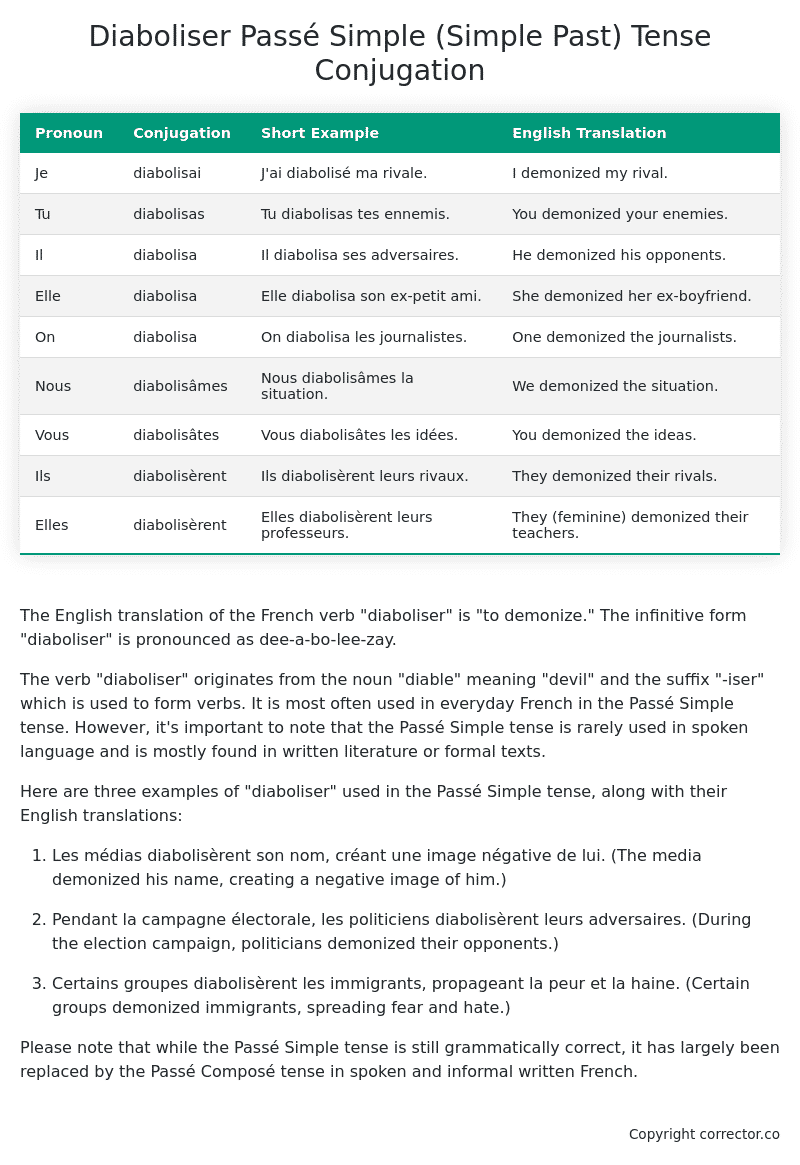Passé Simple (Simple Past) Tense Conjugation of the French Verb diaboliser
Introduction to the verb diaboliser
The English translation of the French verb “diaboliser” is “to demonize.” The infinitive form “diaboliser” is pronounced as dee-a-bo-lee-zay.
The verb “diaboliser” originates from the noun “diable” meaning “devil” and the suffix “-iser” which is used to form verbs. It is most often used in everyday French in the Passé Simple tense. However, it’s important to note that the Passé Simple tense is rarely used in spoken language and is mostly found in written literature or formal texts.
Here are three examples of “diaboliser” used in the Passé Simple tense, along with their English translations:
-
Les médias diabolisèrent son nom, créant une image négative de lui.
(The media demonized his name, creating a negative image of him.) -
Pendant la campagne électorale, les politiciens diabolisèrent leurs adversaires.
(During the election campaign, politicians demonized their opponents.) -
Certains groupes diabolisèrent les immigrants, propageant la peur et la haine.
(Certain groups demonized immigrants, spreading fear and hate.)
Please note that while the Passé Simple tense is still grammatically correct, it has largely been replaced by the Passé Composé tense in spoken and informal written French.
Table of the Passé Simple (Simple Past) Tense Conjugation of diaboliser
| Pronoun | Conjugation | Short Example | English Translation |
|---|---|---|---|
| Je | diabolisai | J’ai diabolisé ma rivale. | I demonized my rival. |
| Tu | diabolisas | Tu diabolisas tes ennemis. | You demonized your enemies. |
| Il | diabolisa | Il diabolisa ses adversaires. | He demonized his opponents. |
| Elle | diabolisa | Elle diabolisa son ex-petit ami. | She demonized her ex-boyfriend. |
| On | diabolisa | On diabolisa les journalistes. | One demonized the journalists. |
| Nous | diabolisâmes | Nous diabolisâmes la situation. | We demonized the situation. |
| Vous | diabolisâtes | Vous diabolisâtes les idées. | You demonized the ideas. |
| Ils | diabolisèrent | Ils diabolisèrent leurs rivaux. | They demonized their rivals. |
| Elles | diabolisèrent | Elles diabolisèrent leurs professeurs. | They (feminine) demonized their teachers. |
Other Conjugations for Diaboliser.
Le Present (Present Tense) Conjugation of the French Verb diaboliser
Imparfait (Imperfect) Tense Conjugation of the French Verb diaboliser
Passé Simple (Simple Past) Tense Conjugation of the French Verb diaboliser (You’re reading it right now!)
Passé Composé (Present Perfect) Tense Conjugation of the French Verb diaboliser
Futur Simple (Simple Future) Tense Conjugation of the French Verb diaboliser
Futur Proche (Near Future) Tense Conjugation of the French Verb diaboliser
Plus-que-parfait (Pluperfect) Tense Conjugation of the French Verb diaboliser
Passé Antérieur (Past Anterior) Tense Conjugation of the French Verb diaboliser
Futur Antérieur (Future Anterior) Tense Conjugation of the French Verb diaboliser
Subjonctif Présent (Subjunctive Present) Tense Conjugation of the French Verb diaboliser
Subjonctif Passé (Subjunctive Past) Tense Conjugation of the French Verb diaboliser
Subjonctif Imparfait (Subjunctive Imperfect) Tense Conjugation of the French Verb diaboliser
Subjonctif Plus-que-parfait (Subjunctive Pluperfect) Tense Conjugation of the French Verb diaboliser
Conditionnel Présent (Conditional Present) Tense Conjugation of the French Verb diaboliser
Conditionnel Passé (Conditional Past) Tense Conjugation of the French Verb diaboliser
Conditionnel Passé II (Conditional Past II) Tense Conjugation of the French Verb diaboliser
L’impératif Présent (Imperative Present) Tense Conjugation of the French Verb diaboliser
L’impératif Passé (Imperative Past) Tense Conjugation of the French Verb diaboliser
L’infinitif Présent (Infinitive Present) Tense Conjugation of the French Verb diaboliser
L’infinitif Passé (Infinitive Past) Tense Conjugation of the French Verb diaboliser
Le Participe Présent (Present Participle) Tense Conjugation of the French Verb diaboliser
Le Participe Passé (Past Participle) Tense Conjugation of the French Verb diaboliser
Struggling with French verbs or the language in general? Why not use our free French Grammar Checker – no registration required!
Get a FREE Download Study Sheet of this Conjugation 🔥
Simply right click the image below, click “save image” and get your free reference for the diaboliser Passé Simple tense conjugation!

Diaboliser – About the French Passé Simple (Simple Past) Tense
Formation
Usage
Narration
Historical Context
Interactions with other tenses
Passé Composé
Imparfait
Conditional and Subjunctive
Summary
I hope you enjoyed this article on the verb diaboliser. Still in a learning mood? Check out another TOTALLY random French verb conjugation!


